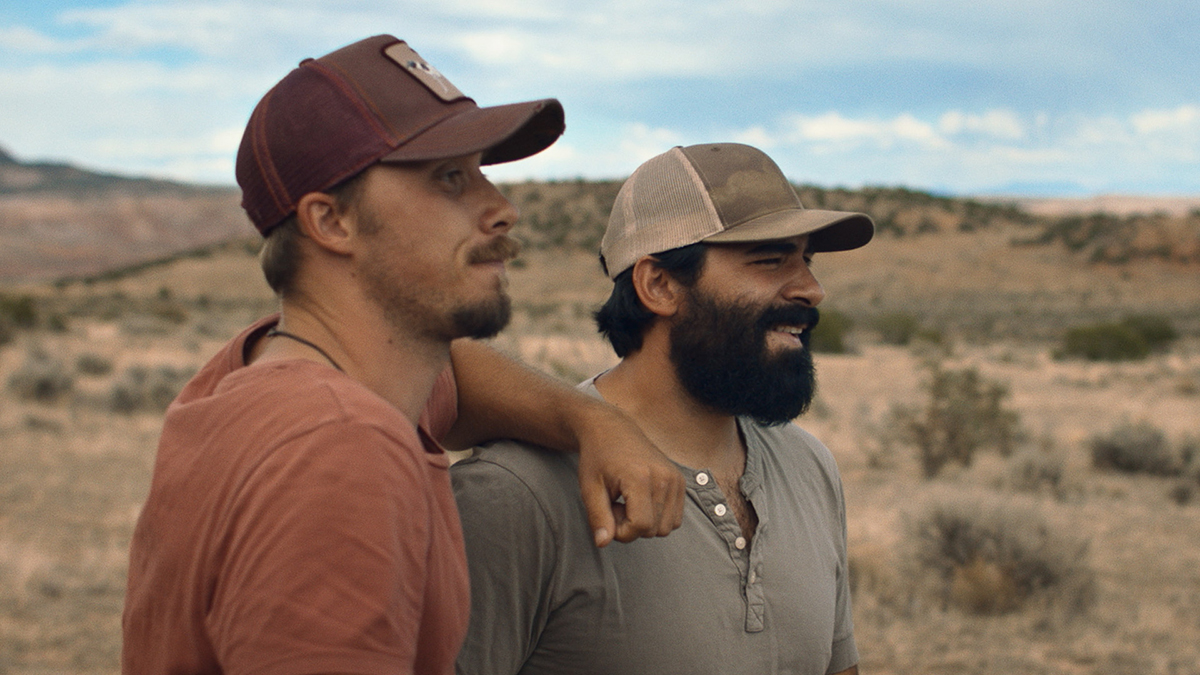Leave it to a Latina to make a film using New Mexico as a site of healing trauma. That’s what AFI graduate and inaugural Adelante Lab fellow Nicole Mejia did with her feature debut A Place in the Field. It follows veteran Gio (Don DiPetta) on his road trip from El Paso, TX to Exeter, CA to bury his army buddy.
Mejia isn’t a veteran, and she bucked advice to tell a deeply personal story for her first film – but that doesn’t mean she doesn’t relate. “One of my best friends – we call each other the trauma twins – he is a veteran, his name’s Daniel Egbert, and he was our consultant for this film,” Mejia tells LatinaMedia.Co over a recent Zoom call. “He served three tours in Iraq and Afghanistan after 9/11… And it’s funny because he and other veterans I’ve spoken to say, ‘oh, as soon as a comeback, I try to actually not associate myself with veterans, I kind of alienate myself.’ And they always find that when they build their community, that’s when the healing occurs.”
That’s a journey Mejia herself can understand, sharing, “I have a lot of sexual trauma. And I always did alienate myself a lot. And it’s so weird [Daniel] and I became friends. We just have so much in common. Unspoken pain and processing that together was really beautiful. And so I asked him, ‘Do you think I could tell this story and honor you?’ And he was like, ‘yeah.’”
The result is a scrappy film, exploring the circuitous path to healing but not offering a “magic cure,” something Mejia says can be a harmful myth Hollywood too often portrays. “It’s our responsibility in media to be honest, and not paint this glamorous thing,” Mejia declares. So for A Place in the Field, she wanted to show a character who’s “taking a step forward, but he’s still in the same place, he still has that [trauma] pulling him back. He has to choose every day to fight for himself and to be happy and to live his life and to have relationships.”
To demonstrate this process, Mejia, her cast, and crew went on a road trip that mirrored the character’s. She recounts, “We just drove around in our RV, really, and that was the movie. The making of the movie was very meta because it was the movie. Everyone was going through their healing process.” Which makes sense as Mejia cites Chloé Zhao’s Nomadland as an inspiration, praising how Zhao’s film uses the environment and gives space for its characters to just interact with what’s around them.
The middle act of A Place in the Field takes place in New Mexico as Gio finds himself delayed due to car trouble. Mejia fills the screen with lingering shots of my home’s distinctive mountains and vistas. Of her approach to filming NM, she says, “This place has so much pain in it and it’s so beautiful… There was war, in this place, people have been killed, and it’s been throughout all times of history since we were having war on horseback to Oppenheimer.”
But there’s also hope here, New Mexico is a place people visit for healing waters, spiritual pilgrimages, and restorative quiet. To portray that aspect, the A Place in the Field crew visited spoken-word poet Xochitl Portillo’s family ranch, which features prominently in the film. As a part of one scene, Portillo even performs one of her poems further echoing the authenticity of this place.

Mejia’s approach is noteworthy because while New Mexico has become a popular filming destination due to tax incentives, the Land of Enchantment is often asked to stand in for other places. From Longmire’s Wyoming to Flamin’ Hot’s Southern California to Primo’s San Antonio, New Mexico rarely plays itself. So it was extra nice to see this place, the state with the highest percentage of Latinxs, finally be a character in a film.
And make no mistake about it, A Place in the Field is a Latinx film, and not just because it’s told from Mejia’s Honduran perspective. “All our actresses are Latinas. And I just love how they’re also Latin women at different stages of their lives,” Mejia reminds, citing not just Portillo but also Vida’s Mishel Prada, Aristotle and Dante’s Marlene Forte, and This Fool’s Lydia Martinez.
Rooted in Mejia’s perspective, A Place in the Field is a scrappy film with a deep sense of place and culture. She sees it as an invitation to work towards healing, even though the path won’t be straight and the destination may never appear. Like Gio’s road trip and the experience of watching the film, the journey will be worth it.
A Place in the Field is streaming now.

